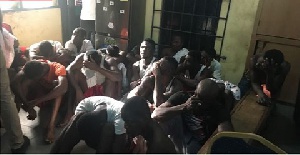 Movements of residents in the traditional area were restricted as part of the funeral arrangements
Movements of residents in the traditional area were restricted as part of the funeral arrangements
Thirty-four persons have been arrested by the police for allegedly looting shops and violently attacking some shop owners in the Nungua Traditional Area.
According to the purported looters, their victims allegedly did not adhere to the curfew imposed on the area by the traditional authorities.
Movements of residents in the Traditional Area in Accra were restricted from Thursday, March 2 as part of funeral arrangements for the high priest of the Ga-Dangme State, Gborbu Wulomor, Wor-lomor Borketey Larweh-Tsuru I.
Beginning 10pm Thursday to 4am the following day, residents at Spintex Road, Sakumono, Addogon, Buade, Opkoi Gonno, Baatsonaa, Kotobaabi, Lashibi, Klagon, Oyibi and adjoining towns were restricted from moving about.
But some residents and shop owners were said to be unaware of the directive and so opened their shops.
The Police Service had indicated that the Nungua Traditional Council had rescinded its decision to impose a curfew on the Nungua township and its environs.
The police, in a statement said, “After a thorough dialogue between the police and the Nungua Traditional authorities, the Traditional Council has rescinded its earlier decision to restrict movements of persons, vehicles and commercial activities during the period.”
The suspects are alleged to have coerced some business owners to comply with the directive by the Council as part of the traditional burial rites of the Wulomor.
They were alleged to have looted and stolen some items from scores of shops in the area, leading to their arrests by the police.
The Council told Citi fm that only some critical institutions such as hospitals and the Electricity Company of Ghana were allowed to operate within the period.
While some complied with the curfew order, others reportedly ignored it. But commercial entities like the ADB Bank, Ghana Commercial Bank and other financial institutions closed their doors to the public as a result of the ban.